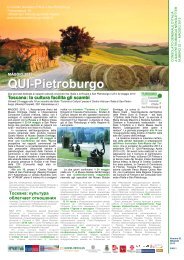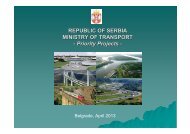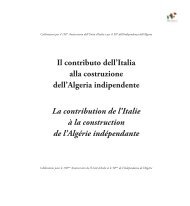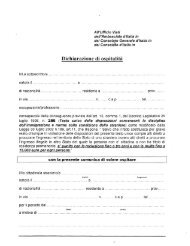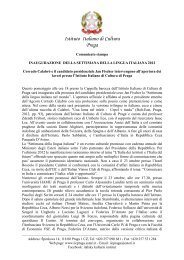Investment in Italy
Investment in Italy
Investment in Italy
- No tags were found...
You also want an ePaper? Increase the reach of your titles
YUMPU automatically turns print PDFs into web optimized ePapers that Google loves.
<strong>Investment</strong> <strong>in</strong> <strong>Italy</strong>• 6 percent for other relatives, with no tax exemptions• 8 percent for beneficiaries not related to the donor or the bequeather, with no taxexemptions.When real estate is <strong>in</strong>herited or gifted, cadastral tax and mortgage tax are applicable at therates of 1 percent and 2 percent respectively. If the real estate is represented by the pr<strong>in</strong>cipaldwell<strong>in</strong>g, the cadastral and mortgage taxes are substituted by a fixed tax of EUR 168.00.6.7International aspects6.7.1ExpatriatesIndividuals will be taxed on a notional salary if they are tax resident <strong>in</strong> <strong>Italy</strong> but are employedand live outside <strong>Italy</strong> for the greater part of the tax year.The notional salary is established each year <strong>in</strong> a decree issued by the Italian M<strong>in</strong>istry ofLabour and Social Security, and is normally used as a basis for pay<strong>in</strong>g Italian social securitycontributions when an Italian employee is seconded to a non-social security treaty country.Italian employers have to levy withhold<strong>in</strong>g taxes on the monthly notional salary for theirItalian employees work<strong>in</strong>g abroad and all the benefits l<strong>in</strong>ked to the foreign employment aredeemed to be <strong>in</strong>cluded <strong>in</strong> the notional salary. Consequently, it may be possible that an Italianemployee seconded abroad is subject to double taxation (<strong>in</strong> <strong>Italy</strong> and <strong>in</strong> the host country).However, double taxation can be avoided through the tax credit mechanism.These rules do not apply to Italian employees who are seconded abroad and who are nolonger Italian tax residents.6.7.2Double taxation reliefResident <strong>in</strong>dividuals are subject to <strong>in</strong>dividual <strong>in</strong>come tax on their worldwide <strong>in</strong>come. In orderto avoid <strong>in</strong>ternational double taxation, a foreign tax credit is granted to residents with foreign<strong>in</strong>come.Such foreign taxes may be credited up to the amount of the IRPEF due on the same <strong>in</strong>come,based on the ratio of foreign <strong>in</strong>come to total <strong>in</strong>come (net of any tax loss carryforwards).If foreign <strong>in</strong>come is derived from more than one country, the foreign tax credit is appliedseparately with respect to each country (i.e. on a per country basis).The credit must be claimed, upon penalty of forfeiture, <strong>in</strong> the tax return for the tax year<strong>in</strong> which the foreign taxes are def<strong>in</strong>itively paid. Accord<strong>in</strong>g to the tax authorities, a tax isdef<strong>in</strong>itively paid when no partial or total reimbursement may be obta<strong>in</strong>ed.No credit is granted <strong>in</strong> the event of failure to file a tax return or to report <strong>in</strong>come producedabroad <strong>in</strong> the tax return. No tax-spar<strong>in</strong>g clause is available at the domestic level.© 2012 KPMG S.p.A., KPMG Advisory S.p.A., KPMG Fides Servizi di Amm<strong>in</strong>istrazione S.p.A., KPMG Audit S.p.A., Italian limited liability share capital companies, and Studio Associato Consulenza legale e tributaria, anItalian professional partnership, are member firms of the KPMG network of <strong>in</strong>dependent member firms affiliated with KPMG International Cooperative (“KPMG International”), a Swiss entity. All rights reserved.65



